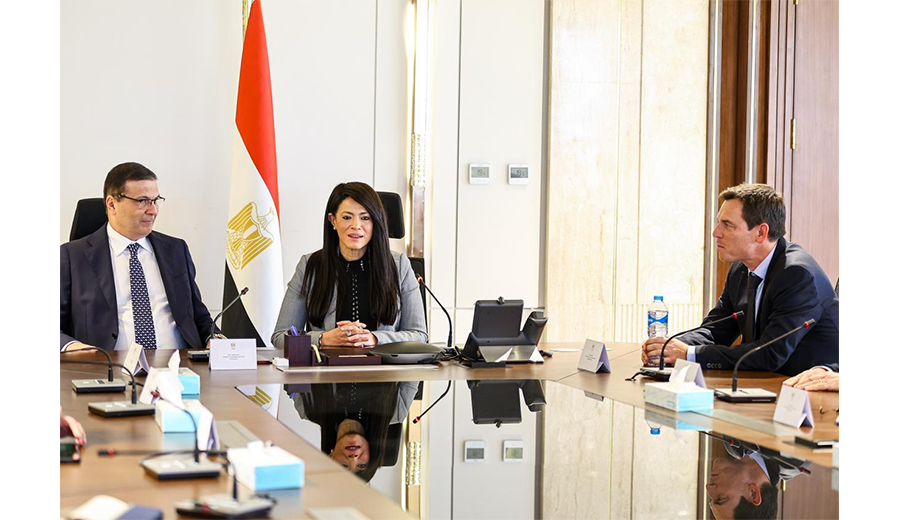During the Hamburg Sustainability Conference Minister of Planning, Economic Development, and International Cooperation Participates in Two Events on Innovative Solutions for Climate Action and Carbon Markets
09 October 2024
Despite global interest in debt swap programs for development, their scale remains low internationally
Innovative financing mechanisms enhance long-term financial stability for developing countries and reduce economic burdens
The launch of Egypt's first voluntary carbon trading and issuance market promotes green economic development
During her participation in the Hamburg
Sustainability Conference, held in Hamburg, Germany, H.E. Dr. Rania A.
Al-Mashat, Minister of Planning, Economic Development, and International
Cooperation, took part as a keynote speaker in two events: "Climate-Proof
Debt Solutions to Enhance Resilience in Developing Economies" and
"High-Integrity Carbon Markets Addressing Inequality," as part of
ongoing international discussions on innovative climate action efforts.
Climate-Proof
Debt Solutions to Enhance Resilience in Developing Economies
In the session on climate-proof debt solutions, H.E.
Minister Al-Mashat emphasized the importance of finding innovative financing
mechanisms to ensure long-term financial stability for developing countries,
thereby alleviating their economic burden. The Sustainable Debt Swap
Initiative, launched by the UN Economic and Social Commission for Western Asia
(ESCWA), is one such innovative mechanism. This initiative provides an
opportunity for debtor and creditor countries to cooperate in accelerating the
implementation of sustainable development goals, achieving recovery, and
enhancing development cooperation, thus enabling countries to achieve
development and implement the Paris Climate Agreement.
H.E. Dr. Al-Mashat pointed out that the initiative
aims to reduce financial pressures on developing and emerging economies and
support them in implementing their development plans by lowering external debt
payments and redirecting those funds into local investments for climate change
mitigation, adaptation, and financing the implementation of sustainable
development goals.
H.E. Minister Al-Mashat noted that, despite
international interest in debt swaps for climate action and development, the
scale of debt swap programs remains low globally and falls short of the
aspirations of developing and emerging countries. She stressed the need for
more innovative mechanisms, such as climate debt swaps, to address climate
change and help developing countries ease their debt burdens while investing
those funds in development projects combating climate change.
H.E. Dr. Al-Mashat also reviewed Egypt's efforts to
achieve sustainable development goals, including the launch of Egypt Integrated
National Financing Strategy (E-INFs) during the 79th United Nations General
Assembly. She also mentioned debt swap programs for climate action implemented
under the "NWFE" program with Germany, along with previous programs
with Italy and the recently signed Memorandum of Understanding with China.
H.E. Dr. Al-Mashat affirmed that Egypt's experience
in debt swaps is based on a comprehensive approach and clear governance rules
to maximize the benefits of these programs, achieve measurable results, and
implement priority projects across various sectors.
The session featured Dr. Moritz Kraemer, Chief
Economist and Head of Research at German LBBW Bank, Ms. Vera Songwe, Chair and
Founder of the Liquidity and Sustainability Facility, Ms. Anneliese Dodds, UK
Minister of State for Development, Foreign, Commonwealth and Development
Office, and Mr. Ilan Goldfajn, President of the Inter-American Development
Bank.
High-Integrity
Carbon Markets Addressing Inequality
In a related session, H.E. Dr. Al-Mashat
participated as a keynote speaker in a discussion on "High-Integrity Carbon Markets
Addressing Inequality" where she discussed the Egyptian government's
launch of its first carbon registration, issuance, and trading market. This
step is crucial in achieving economic and environmental sustainability and
demonstrates Egypt's commitment to adopting innovative policies to mitigate the
impacts of climate change.
H.E. Minister Al-Mashat explained that the launch of
Egypt's first carbon market is the result of collaborative work and
coordination with the World Bank, supported by the Development Policy Financing
implemented by Egypt's Ministry of Planning and Economic Development in
partnership with the World Bank. This initiative was launched through
structural reforms and technical support for the Financial Regulatory
Authority.
H.E. Dr. Al-Mashat emphasized that carbon markets
are effective tools that encourage companies to reduce harmful emissions by
providing tradable carbon credits to investors and companies struggling to
lower their emissions. Trading carbon credits can reduce the cost of
implementing Nationally Determined Contributions (NDCs) by more than half,
enhance the green economy’s contribution to GDP, increase green investments,
and help meet targets across various aspects of the green economy. Moreover,
carbon markets provide an effective means of securing financing for the green
transition.
H.E.Minister Al-Mashat also highlighted key elements
necessary for the success of carbon markets, including transparency, real
climate mitigation, and tangible benefits, especially for developing countries.
Carbon credits, functioning similarly to financial assets or securities, make
the financial sector central, both as a financier and trader of carbon credits,
in line with global efforts to ensure the financial integrity of carbon
markets.
The session featured Dr. Jochen Flasbarth, State
Secretary at the German Federal Ministry for Economic Cooperation and
Development; Dr. Christiane Laibach, Member of the Executive Board at the
German Development Bank (KfW); Dr. Arif Havas Oegroseno, Indonesian Ambassador
to Germany; Heike Vesper, CEO of the World Wide Fund for Nature (WWF) in
Germany; and Tim Christophersen, Vice President of Markets at Salesforce.









